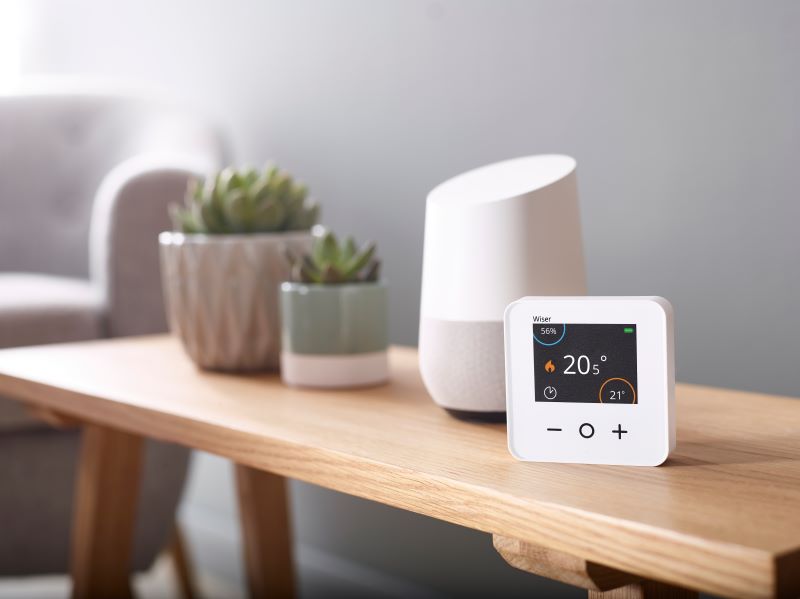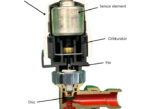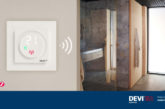
As technology continues to support people in their day-to-day lives, homeowners are looking to smart heating controls not only to help manage their homes but due to their cost-saving credentials. Merlin Milner, Product Owner for Water-based Heating Systems at Drayton, discusses how smart heating controls can offer convenience, comfort, and cost-efficiency.
According to Meltwater’s 2024 Global Overview report, over 28% of 16-64 year olds own some form of smart home device in the UK. It is evident from this statistic that while once a novelty, smart technology is becoming a common fixture within many homes, no surprise given that 34% of those surveyed for Schneider Electric’s latest consumer report consider adopting smart home devices as an easy way to reduce energy use.
In addition, YouGov states that 1.7 million UK residents are using smart systems, like Wiser, to manage their heating. This makes sense given the ongoing cost-of-living crisis, as BEAMA research shows that annually smart controls can offer savings of up to 18% when upgrading from a traditional thermostat and programmer.
Of course, while savings are appealing, smart heating controls can also help support the busy modern homeowner in managing and automating tasks, offering those who enlist them maximum efficiency. So how can smart controls offer the best in convenience and comfort?
Get smart
Homeowners can save around 16% on energy usage by making use of smart modes, such as Away Mode and Eco Mode, often found with smart controls. If that isn’t appealing enough, smart modes are great for saving household’s valuable time too.
Wiser’s Away Mode is useful for busy homeowners who find that their daily schedules can change with little notice. For example, those who like to socialise after work and won’t be back as expected can activate Away Mode remotely in order to override their pre-set heating schedule, turning off the heating to avoid wasted energy and costs.
Furthermore, Wiser’s Eco Mode saves time and money by intuitively combining optimum stop and weather compensation to learn more about the thermal properties of an individual’s home and then using this information to manage the heating accordingly.
This means that without homeowner intervention the system learns when best to automatically switch the boiler off, sometimes before it is scheduled to, whilst still maintaining the desired setpoint.
This allows the homeowners to enjoy optimum comfort, without having to waste energy powering a boiler that has already achieved its set point temperature. What’s more, this is made possible without any inconvenience to the homeowner, given that the system automatically adjusts to the environment without the need for any complex calculations.
In the zone
Multi-zoning is a tried and tested method that not only offers convenience but can save the average homeowner up to 19% on energy bills, according to BEAMA research.
Smart multi-zoning is a time saver in that it can control heating from room-to-room via an app, like Wiser Home. With zoning, homeowners needn’t manually turn radiators on and off, or adjust temperatures in individual rooms using individual TRVs.
Again, ideal for a busy household with people that have different and frequently changing needs, who don’t want to be inconvenienced by manually managing the heating from room-to-room. For example, with the click of an app, parents or guardians can reduce the temperature in the room of a sleeping baby, whilst managing a cosier temperature in the lounge. Equally, home workers can keep their home office toasty while maintaining unused rooms at decreased temperatures, without having to leave their desk and interrupt their workflow.
Drayton provides guidance on how installers can fit the company’s new Digistat
On schedule
Scheduling is one of the most popular methods homeowners use to manage their heating for cost-savings and convenience. Heating control apps, like Wiser Home, supports users in setting their heating schedules with their smartphones, meaning gone are the days of manually altering traditional thermostats.
Once again, this is perfect for the busy modern homeowner whose schedule can change at short notice. With smart heating controls, heating schedules are easier to implement than ever before, meaning less friction for users to take advantage of such settings.
For example, if a homeowner’s work-from-home day changes from a Tuesday to a Wednesday, at the touch of a screen the heating schedule can be adapted to account for this. Equally, if a user’s transport home from work is delayed, the schedule can be pushed back to save heating empty rooms.
Even smarter
For ultimate efficiency, smart heating controls can be integrated with other smart home devices. For example, Wiser can be activated by voice command with virtual assistants, such as Amazon Alexa and Google Assistant, found in 31% of UK homes.
Homeowners who may be busy preparing dinner, or putting the children to bed can simply ask for the heating to be turned down without having to lift a finger, equally those getting cosy in front of a film can request the heating to be turned up to the required temperature. Such a feature can further support the convenience that heating controls bring.
Smart heating controls are fast becoming more mainstream, especially in line with homeowner efforts to drive bills down, which according to Schneider Electric’s latest survey is of concern to 81% of UK homeowners. However, while cost-savings are important, it is clear that as the modern homeowner continues to value convenience, smart heating controls are a must for those managing the home while juggling busy work and family commitments.












